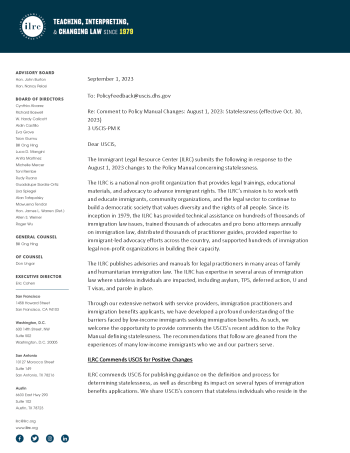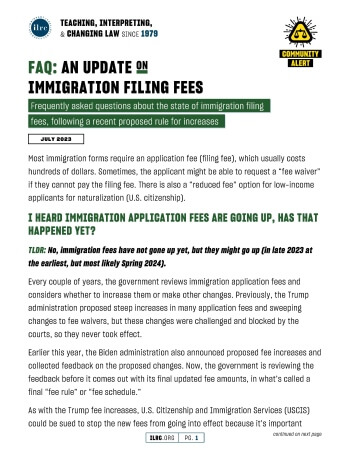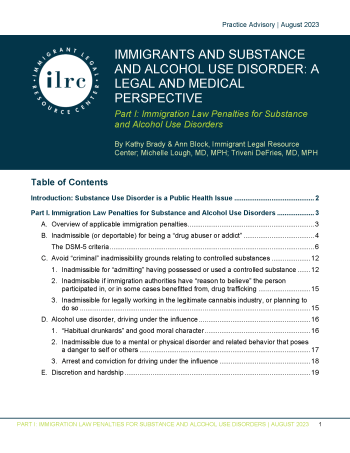Term Page
Family-Based Common Waivers of Inadmissibility
Family-Based
Confused about the difference between the I-601 and I-601A, I-212 versus 212(h) waivers, or how exactly one may waive the permanent bar? This webinar will cover some of the most common waivers of inadmissibility including waivers of unlawful presence...
Parole in Immigration Law
DACA
Family-Based
U Visa/T Visa/VAWA
The Immigrant Legal Resource Center created the first comprehensive manual about parole in immigration law in 2016 to provide practitioners with a one-stop guide to the legal requirements of all the different types of parole, practice pointers about...

On August 1, 2023, USCIS published long-awaited Policy Manual guidance on the definition and process for determining statelessness. ILRC commented favorably on most of the guidance and made suggestions for some improvements.

This practice alert provides an overview of new USCIS policy guidance and a recent BIA case that now officially acknowledge that the three- and ten-year unlawful presence bars can run in the United States. This practice alert summarizes current policy on the three- and ten-year bars as well as covering who does (and does not) benefit from this policy.

This quick guide shares how to check your Selective Service registration status. For various applications with U.S. Citizenship and Immigration Services (USCIS), providing proof of registration with the Selective Service System is a vital part of qualifying for immigration relief. Learn more with this step-by-step guide.

This FAQ provides an update on immigration application filing fee changes that were recently proposed by U.S. Citizenship and Immigration Services (USCIS).

Immigration law demonizes people whom it labels as “drug abusers and addicts,” “habitual drunkards,” and “alcoholics.” The implication is that they are morally weak, dangerous, or evil. An immigrant who comes within such a category can be found inadmissible and ineligible to establish good moral character, and can be denied several forms of immigration relief as well as naturalization. But from a scientific perspective, these people suffer from a substance use disorder (SUD), a medical condition that frequently arises after the person has undergone severe trauma. Substance Use Disorder is a growing health crisis that currently affects over 20 million people in the United States.
This Advisory is written by immigration attorneys and medical doctors specializing in SUD, to examine the issue from both perspectives. Part I of the advisory discusses the several immigration law penalties based on substance use (even when use has not risen to a disorder) and suggests legal defense strategies. Part II of the advisory reviews current medical information about the disorders and discusses how this information can address questions that arise in immigration proceedings.
This Advisory is written by immigration attorneys and medical doctors specializing in SUD, to examine the issue from both perspectives. Part I of the advisory discusses the several immigration law penalties based on substance use (even when use has not risen to a disorder) and suggests legal defense strategies. Part II of the advisory reviews current medical information about the disorders and discusses how this information can address questions that arise in immigration proceedings.

Undocumented individuals who have U.S. citizen children often ask when and if their child can help them obtain their Lawful Permanent Resident status. A citizen child who is over 21 years old can begin the process for a parent to get their Permanent Residence card, often referred to as a green card. However, the process can be complicated and any parent seeking a green card through their child needs to carefully consider certain things before they move forward. This guide provides a brief explanation of this process, what is needed for a son or daughter to help their parent(s) obtain status, and some considerations to keep in mind as you explore this process.

